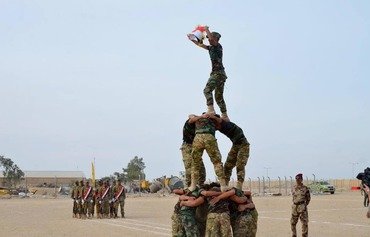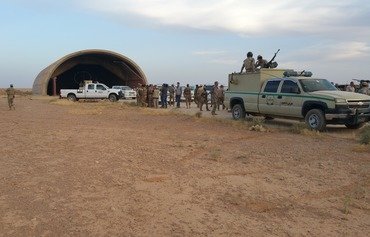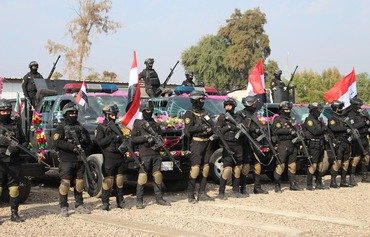Iraqi forces and tribal mobilisation fighters have completed preparations to storm the last remaining territories under the control of the "Islamic State of Iraq and the Levant" (ISIL) in Anbar province, Iraqi military officials announced.
Once the towns of Rawa, Anah and al-Qaim in the westernmost part of Anbar are liberated, the province will be declared fully ISIL-free, they told Diyaruna.
Rawa and Anah are located along the upper Euphrates River, while al-Qaim is situated right on the Syrian border and has been used by ISIL to house its top leaders and hold important meetings due to its strategic location close to Syria's eastern border.
"Military units from the Iraqi army's 7th Division and al-Jazeera and al-Badiya forces have completed their security and logistic preparations to liberate the western Anbar towns from the grip of ISIL," commander of the 7th Division Maj. Gen. Numan al-Zawbai told Diyaruna.
ISIL launches attack on al-Rutbah
On Sunday (October 23rd), ISIL fighters took over parts al-Rutbah, a remote but strategic town in Anbar province near the Jordanian border .
ISIL briefly seized the mayor's office before being pinned back by the security forces, but were still deployed in some other neighbourhoods of the town, AFP reported.
"They captured people -- civilians and policemen -- and executed them," an Iraqi army colonel told AFP, adding that "at least five people were executed" on Sunday.
Lieutenant General Ismail al-Mahalawi, head of the Operations Command for the western Anbar province, confirmed the executions but said Iraqi forces were regaining the upper hand.
"Military units from the (army) 8th division and a brigade from Anbar Operations Command moved to al-Rutbah, redeploying there to clear the positions ISIL control in the city," he said.
The attack on al-Rutbah is seen as a fresh attempt by ISIL to draw attention and Iraqi military resources away from Mosul , which is their last major stronghold in the country.
Unified effort
After liberating Lake Tharthar in March and securing the road between Baiji and Haditha, Iraqi forces are now ready to storm ISIL's last strongholds in Anbar, he said.
"The number of ISIL elements controlling those towns makes no difference to the Iraqi forces, which are determined to eliminate them or drive them across the border," he said.
The operation will be supported by the Iraqi air force and coalition warplanes, he said, adding that "tribal mobilisation forces will hold the territory in liberated areas".
The operation to liberate these towns will start soon, al-Baghdadi district tribal mobilisation commander Sheikh Qatari al-Samarmad told Diyaruna.
"Tribal fighters will play a major role in the fighting, including the tribes of al-Jaghaifa, Albu Nimr and Albu Mahal, and the newly-formed mobilisation from areas to the west of Rawa and Anah," he told Diyaruna.
There is high-level co-ordination with the security forces, he said, noting that 7th Division forces are providing weapons and gear to the mobilisation fighters.
"Missions are divided between the two sides, with the army forces in charge of storming the cities and mobilisation fighters responsible for holding the territory," he said.
Accommodating displaced residents
"The local government in Anbar has developed a comprehensive plan for receiving and accommodating families that could be displaced from those areas after the start of the operations," provincial council member Fahd al-Rashed told Diyaruna.
The plans for accommodating the displaced are similar to those implemented in other areas in the province such as Ramadi and Fallujah, he said, adding that "local officials now have significant experience in this field".
"ISIL will not be able to put up much resistance in those cities due to its fighters' degraded morale," he said.
"Consequently, there will not be destructive fighting there and plans to restore stability and reconstruct those towns will likely be much easier than in other parts [of Anbar]," al-Rashed said.
Since the towns are located close to the borders with Syria and Jordan, Iraqi forces "must work to secure these borders to prevent infiltration attempts by terrorists from neighbouring countries", he said.
"The international borders connecting Anbar with neighbouring countries stretch along vast swaths of land and require large forces and international support to be adequately secured," he added.
ISIL's collapse in Fallujah, Saqlawiya and Ramadi has dealt a crushing blow to the group in Anbar, he said, as 70% of its fighters were deployed in those cities.

![Iraqi soldiers raise the Iraqi flag atop a building in Heet in Anbar province after liberating it from the 'Islamic State of Iraq and the Levant'. [Photo courtesy of the Joint Operations Command]](/cnmi_di/images/2016/10/24/6408-Iraq-Heet-ISIL-600_384.jpg)






